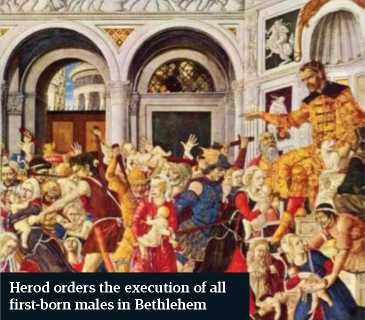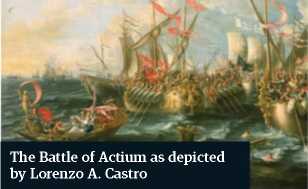In a fit of psychotic rage, Herod killed his two eldest sons because he thought they were plotting against his kingship
Number of grovelling letters to Octavian promising his undying loyalty in return for being allowed to keep his job as King of the Jews. Octavian reluctantly allowed him to remain king, again more through a lack of a better option than any reflection on Herod's skill as a leader.
Despite having survived one of the most destructive civil wars in Rome's history, Herod remained uneasy. He became estranged from his wife after he had her placed under guard to prevent her from claiming the throne for the Hasmoneans if he died during the fighting. He heard more rumours of threats against his life, he feared Mariamne would try to grab power by killing him in revenge for having her arrested, his behaviour became increasingly erratic and he fell into a strange psychotic state of paranoia. While he was suffering from this break from reality, he became convinced Mariamne was going to kill him, so he acted. He had her beheaded, but as soon as the axe fell, he came around from his delusion and realised he'd made a terrible mistake. He wept uncontrollably for weeks and began hallucinating visions of his dead wife screaming in agony in the corridors of his palace.
In an effort to try and turn his mind away from these terrifying visions, he began to construct a grand temple designed to be the envy of the ancient world. Construction started just after the death of Mariamne, and was only halted briefly after a great famine struck the city. When Caesar's aide Marcus Agrippa visited the city in 15 BCE, he was amazed at the temple's construction and how modern Jerusalem looked since its sacking by Antony. Agrippa held court with Herod, and Herod, knowing that weakness in front of the Romans could be dangerous, managed to hide his precarious mental state. Underneath this fagade, he was a man edging ever closer to madness.
After Agrippa left for the gates of Rome, Herod quickly returned to the depths of paranoia. He brutally slaughtered any who spoke out against his dictatorial regime, and the country lived in fear of his violent moodswings. He burned alive a group of rabbis and their students who had pulled down a Roman imperial eagle in a building in Jerusalem. He then executed two of his eldest sons because he thought they were plotting against him. By 4 BCE, he feared that he had become so unpopular that no one would mourn his passing after he died. In a fit of depraved madness, he ordered the families of the nobility throughout the kingdom to attend him on pain of death. He then had them rounded up and placed under guard in the city's hippodrome. The guards were ordered to murder them when he died so his death would be mourned.
As the families in the hippodrome huddled together, terrified at the prospect of being put to death as a sacrifice to the passing of their own king, Herod laid on his deathbed racked with pain. He was suffering from kidney failure and the paranoid delusions that had finally left him senseless. He saw visions of his beloved Mariamne and was tortured by her mutilated face. When he finally died screaming in agony in 4 BCE, the holy men of Jerusalem proclaimed that his horrific death was, 'the penalty that God was exacting of the king for his great impiety.' Herod's sister countermanded the order to kill the Judean families and the kingdom celebrated; Herod 'the mad and wicked' was dead.
A biblical connection
Herod has been reviled in the bible as the monstrous tyrant who threatened the life of the baby that Christians believe was the son of God. Jesus of Nazareth's birth came at the end of Herod's reign, when his psychotic episodes had become increasingly dangerous to the people he suspected were plotting treason against him. According to the Bible, it was during one of these paranoid episodes that he heard word of a child being born proclaimed as the 'King of the Jews'. This was highly threatening as far as Herod was concerned, as he had never been fully accepted by his Jewish subjects as their true king, and any kind of usurpation from another individual claiming to be their ruler had to be destroyed. He went into a fit of rage, ordering all the sons of Bethlehem, the birth place of Jesus, murdered in what became known as the 'Massacre of the Innocents.' While the Bible is not considered historically accurate by scholars, Herod's violent reaction was alluded to by Roman sources writing after the event, and archaeologists have speculated the massacre occurred at some point in 5 BCE, a year before Herod died. His actions have since been immortalised through the story of the Nativity, and his reputation for uncompromising brutality has never been forgotten in Christian traditions.


Defining moment




 World History
World History









